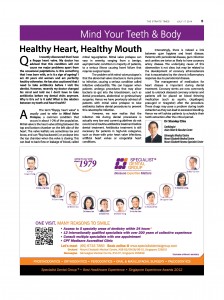 This article first appeared in the July 17th, 2014 issue of The Straits Times Mind Your Body. We have reproduced it for the information of those of you who missed it when it was published.
This article first appeared in the July 17th, 2014 issue of The Straits Times Mind Your Body. We have reproduced it for the information of those of you who missed it when it was published.
Q: I recently discovered that I have a floppy heart valve. My doctor has advised that this condition will not cause me major problems apart from the occasional palpitations. Is this something that I was born with, or is it a sign of ageing? I am 40 year old woman and am perfectly healthy otherwise. He has also cautioned that I need to take antibiotics before I visit the dentist. However, recently my doctor changed his mind and told me I don’t have to take antibiotics before my dental visits anymore. Why is this so? Is it safe? What is the relation between my teeth and heart health?
A: The term “floppy heart valve” is usually used to refer to Mitral Valve Prolapse, a common condition that occurs in about 1-2% of the population. Mitral valve is the heart valve sitting between the top and bottom chamber on the left side of the heart. The valve leaflets are sometimes lax and loose, and can “flop backwards”, or prolapse into the top chamber when the valve is closing. This can lead to back flow or leakage of blood, called mitral regurgitation. Mitral valve prolapse can vary in severity, ranging from a benign, asymptomatic condition in majority of patients, to a serious illness causing heart failure that requires surgical repair.
The problem with mitral valve prolapse is that the abnormal valve structure is more prone to infection, causing a serious condition called infective endocarditis. This can happen when patients undergo procedures that may allow bacteria to get into the bloodstream, such as dental procedures, abdominal or genitourinary surgeries. Hence we have previously advised all patients with mitral valve prolapse to take antibiotics before dental procedures to prevent this catastrophic infection.
However, we now realize that the infection risk during dental procedures is actually very low and current guidelines do not recommend routine antibiotics treatment before dental treatment. Antibiotics treatment is still necessary for patients in high-risk categories, such as those with prior heart valve infections, artificial heart valves or congenital heart conditions.
Interestingly, there is indeed a link between gum hygiene and heart disease. Patients with periodontal disease, gum infection and cavities are twice as likely to have coronary artery disease. The underlying cause of this observation is not clear, but may be related to the development of coronary atherosclerosis that is exacerbated by the chronic inflammatory response due to periodontal disease.
The management of medication for heart disease is important during dental treatment. Coronary stents are now commonly used to unblock diseased coronary arteries and patients will be placed on blood thinning medication (such as aspirin, clopidogrel, prasugrel or ticagrelor) after the procedure. These drugs may pose a problem during tooth extraction as they can lead to excessive bleeding. Hence we will advise patients to schedule their tooth extraction after the critical period.
 Dr Stanley Chia
Dr Stanley Chia
Cardiologist
Asian Heart & Vascular Centre
Gleneagles Medical Centre
Mount Elizabeth Medical Centre
Mount Elizabeth Novena Specialist Centre
Source: © Singapore Press Holdings Limited. Reproduced with permission





